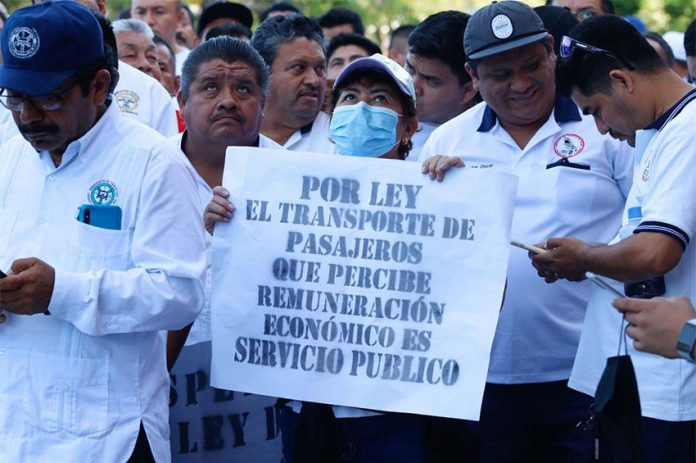More than 40,000 taxi drivers from the unions of Cancún, Playa del Carmen, Tulum and Chetumal demonstrated on Wednesday across Quintana Roo against the possibility of Uber operating in the state without a public transportation concession.
The protests were organized in anticipation of a Wednesday verdict that could have allowed Uber to enter the Quintana Roo market.
But the scheduled court session was pushed to a future date, and taxi drivers ended the protests shortly after the announcement.
“We [taxi drivers] are not against digital platforms entering the state,” said Eleazar Sagrero, the leader of a group of taxi unions to La Jornada, “but these platforms must comply with the regulations and guidelines of the law.” He added that Cabify, with over half a million units in the state, operates in compliance with local mobility regulations.
Sagrero added that despite the court’s adjournment, the union will continue to get legal advice. “We will keep on fighting to protect our taxi drivers’ work.”
According to Quintana Roo’s mobility law, public transport companies must operate through a state concession — a requirement Uber argues doesn’t apply to the ride-hailing company as it is not a public transport enterprise. Under such an argument, Uber filed an amparo in 2019 (a legal resource to ask the government for protection against human rights violations) saying that the company should be allowed to operate with a business permit, rather than a state concession.
Back in 2021, the Supreme Court of Justice (SCJN) favored Uber when it ruled that its business model is different than those of public transportation companies. The SCJN added that its decision went in line with two previous Constitutional Actions (Acciones de Constitutcionalidad) in Yucatán and Colima, in which the Court ruled that “due to the nature of the service, [Uber] is a private company.”
Users are also in favor of Uber operating in Quintana Roo. After reading support messages in social media, La Jornada reported that users think granting permission to Uber and other app-based brands would force taxi drivers to improve their services and lower their prices.
People interviewed on the streets also agreed, La Jornada reported. For instance, Carmen Cabrera from Tulum, told the newspaper that the local taxi service, in addition to not being good, is expensive. She also said that taxi drivers prefer foreigners over locals — an accusation confirmed by Selma Sánchez, another resident of Tulum.
Selma’s husband, who has a leg prosthesis, told La Jornada that taxi drivers often charge him more when he brings his wheelchair. “Instead of helping me out, they get upset and call me names,” he complained.
Sagrero said that the taxi driver’s reputation cannot be based on the bad customer experience of a few. However, he encouraged users to complain with the corresponding taxi unions when they receive bad service.
Although no date has been set for the next court’s session, unions have warned of a demonstration from Cancún to Tulum if the court rules in favor of Uber operating in the state, reported Milenio.
With reports from La Jornada and Milenio
